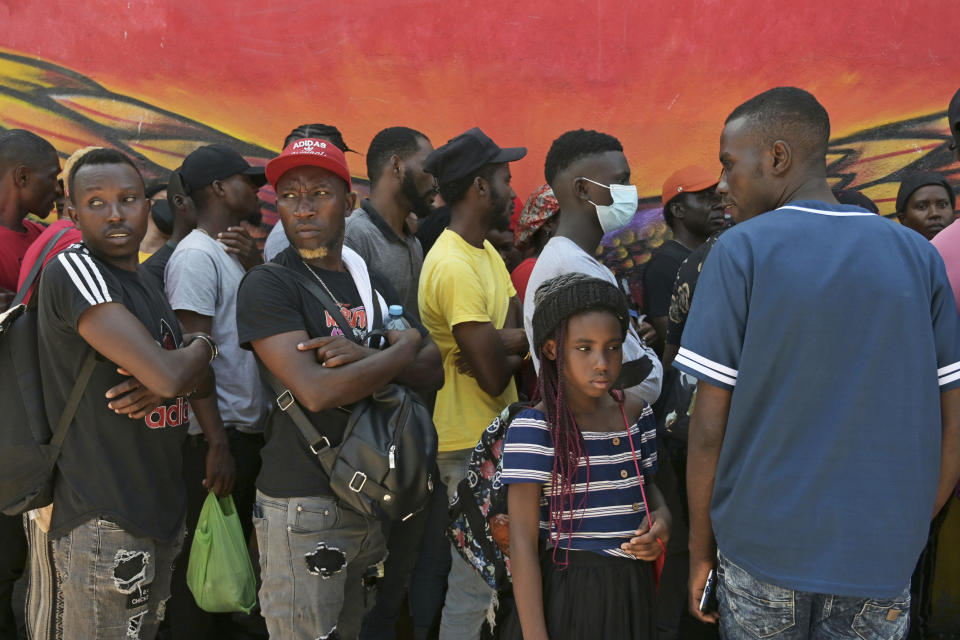Biden immigration policy giving temporary legal status to thousands faces court challenge
- Oops!Something went wrong.Please try again later.
A Biden administration policy that has allowed thousands of people from Latin America and the Caribbean to temporarily live and work in the U.S. is headed to court Thursday as a group of Republican-leaning states challenge its legality.
The humanitarian parole program, announced in January, allows up to 30,000 people from Cuba, Haiti, Nicaragua and Venezuela to be admitted into the U.S. each month “for urgent humanitarian reasons or significant public benefit” on a case-by-case basis, according to the Biden administration. Under the program, migrants are allowed to stay in the U.S. for up to two years and must go through an online application process, have a financial sponsor and undergo background and security checks.
Almost 160,000 Cubans, Haitians, Nicaraguans and Venezuelans have arrived under the parole program through the end of June, according to the administration.
A total of 21 Republican-leaning states have challenged the policy, calling it “unlawful” in an amended complaint in February. They wrote that President Joe Biden “has effectively created a new visa program — without the formalities of legislation from Congress.”
District Judge Drew Tipton in Victoria, Texas, a Trump appointee, will begin hearing arguments challenging and defending the program's legality Thursday.
In April, Tipton granted a motion allowing a group of seven U.S. citizens who are sponsoring people through the program or are applying to sponsor them to join the legal proceedings in order to defend the program. The seven are represented by immigrant rights groups, the Justice Action Center, RAICES, and the Center for Immigration Law and Policy at the UCLA School of Law.
Eric Sype, 30, is sponsoring a Nicaraguan man he describes as his “chosen family” whom he visited whenever possible and spent holidays with after they met when he was a college student in 2014.
He said the man lives with his wife and two children in a coastal community that has been hit hard by tropical storms and hurricanes over the past few years. Combined with massive political unrest in Nicaragua beginning in 2018, the man’s family is at risk and without opportunities, he said.
Those events, along with the pandemic, “have really had a tremendous impact on the community that he lives in and on his own economic realities,” Sype said.

Sype, who welcomed his friend to the U.S. earlier this month, said the man is here to work hard on his cousin’s farm in order to provide for his family.
“It would just be such a shame for this program to be ended, as it just seems like a kind of bright light in a much larger broken immigration system,” he said.
The humanitarian parole measure is part of the Biden administration’s expansion of legal immigration pathways that temporarily allow people fleeing political and economic instability to come to the U.S., including after Russia invaded Ukraine.
More than 100,000 Ukrainians have been granted entry under the Biden administration’s “Uniting for Ukraine” parole program.
That program is not part of the challenge by Republican states in the Texas lawsuit.
“We have overseen the most significant expansion in lawful pathways for people to come to the United States in many decades as a result of our efforts to try to incentivize intending migrants to use safe, orderly, and lawful pathways to come to the United States,” Blas Nuñez-Neto, DHS’ assistant secretary for border and immigration policy, said in May. The administration has credited these policies with helping to decrease the number of crossings at the southern border.
Esther Sung, legal director of the Justice Action Center, said the seven individuals the organization represents in the case highlight the many positive reasons people are choosing to take part in the parole program, as well as its benefits.
Among those she and her group represent is a doctor who hopes to sponsor the mother of a young woman who “has very serious medical problems and is in need of surgery,” Sung said.
The doctor wrote in a declaration to the court that she worries “that if the program is terminated before her mother arrives, the young woman may not be able to receive the life-saving surgery that she needs.”
“In the immigration landscape that we have, this is the one benefit and therefore very worthy of defending,” Sung said.
The 21 states that are challenging the parole program for people from Cuba, Haiti, Nicaragua and Venezuela argued in their complaint that the policy was unlawful, in part because it exceeds the federal government’s “statutory parole authority” and does not meet the criteria for being used “only on a case-by-case basis for urgent humanitarian reasons or significant public benefit.”
The states also argue the policy will cause irreparable harm to the states by straining their resources.
The office of the attorney general in Texas, the first state to file the lawsuit against the policy, and the Department of Homeland Security did not immediately respond to requests for comment on the lawsuit and the hearing.
This article was originally published on NBCNews.com

